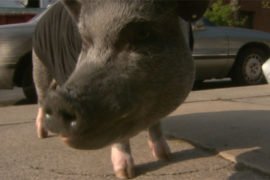The agency assuages the concerns of rental property owners over phony comfort animals while enforcing the need for reasonable accommodations for those with a genuine need.
In an earlier blog, we said that the days are numbered for dubious and predatory websites that sell certificates, registrations and licensing documents for assistance animals to anyone who answers certain questions or participates in a short interview and pays a fee.
The number of these websites has grown exponentially with at least one offering a how-to manual on suing a landlord when an assistance animal is turned away. HUD has expressed skepticism over these letter mills and after issuing concrete guidance on assessing a person’s request to have a reasonable accommodation under the Fair Housing Act (FHA), the agency has finally provided some structure and clarity regarding an apartment’s owner’s prerogative to accept pets.
While we know this can be an emotional subject for many, Bornstein Law wants to reiterate that we are not against pets, no more than we oppose handicapped parking spaces.
We do believe, however, that rental property owners and operators should be the final arbiter of what goes on in their units, and that a mandate to accept animals should be reserved for tenants who require an animal for an equal opportunity to use and enjoy their homes.
This sentiment was echoed by the National Multifamily Housing Council in a statement that the heretofore lack of clarity in the law puts an undue burden on housing providers and “undermines the intent of the Fair Housing Act to help those truly in need of an emotional support animal.”
In stating their position, the NMHC goes onto say that the sorely needed guidance “will help rental housing providers mitigate abuse, ensure better compliance with fair housing laws, and, vitally, improve the ability of owners and operators to protect the rights of disabled persons to live with their service animals and emotional support animals.”
Disabilities saw and unseen
HUD’s new tutelage has made a clear distinction between a person with a non-obvious disability and in those situations when a disability is not readily apparent, documentation from a medical professional may be required. Although housing providers have less rope to hang themselves, we still need to be careful about prodding too much, or in the event a disability is obvious, asking for any documentation whatsoever.
The terms floating around can be like consuming a box of animal crackers
Many rental housing providers have gotten tripped up over the categorization of animals, whether the furry or scaly friend is a bona fide service animal, an assistance animal, an emotional support animal, comfort animal, a companion animal or other terms they can be lumped in, or simply just a pet.
Let’s compartmentalize animals into one overarching term – assistance animals – and divide these into two parts.
The definition of a service animal has remained unchanged. Namely, it is “any dog that is individually trained to do work or perform tasks for the benefit of an individual with a disability, including a physical, sensory, psychiatric, intellectual, or other mental disability.” Other species of animals are not service animals under the definition of the American with Disabilities Act (ADA).
While guide dogs for the blind are the first thing to come to mind, service animals can perform a host of other tasks like alerting their owner to signs of a seizure, retrieving items such as medicine or the telephone, interrupting impulsive or destructive behaviors, among other duties.
There are, however, “other trained or untrained animals that do work, perform tasks, provide assistance, and/or provide therapeutic emotional support for individuals with disabilities” that are considered assistance animals. This broader category of assistance animals need not be dogs and indeed, the media has made a laughing stock out of potbellied pigs, peacocks, turkeys, alligators, and other species that have been allowed to board airplanes or allowed into rental units, because these animals aide their owners.
Interestingly, HUD probes into whether the animal question is a common household pet.
In promulgating its guidelines, HUD offers a question and answer format, and one question is whether the animal is “commonly kept in households.” If the answer is in the affirmative, the owner or property manager should make reasonable accommodations under federal and state fair housing laws.
If the tenant who would otherwise be entitled to a reasonable accommodation seeks to co-exist with an animal that is not considered commonly kept in households, accommodation would not be required unless it falls under the rarest of circumstances. No kangaroos or monkeys allowed.
Conclusion
It is uncontested that a disabled person deserves reasonable accommodations under federal and state law – HUD’s new guidelines have not changed the landlord’s duty to accommodate residents with disabilities, but has provided a framework to get to the heart of the question: what is a disability?
In a balanced approach, the agency has painstakingly offered a framework for rental providers to evaluate the veracity of a tenant’s claim they are disabled while ensuring reasonable accommodations are not stripped away from tenants who are in fact disabled.





